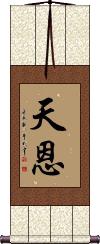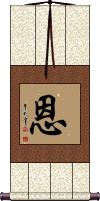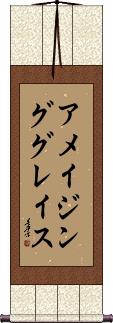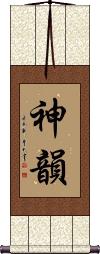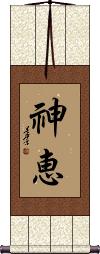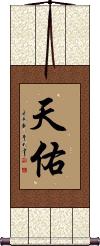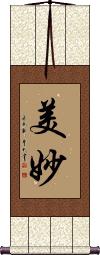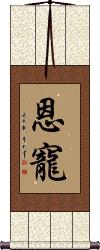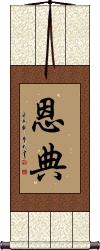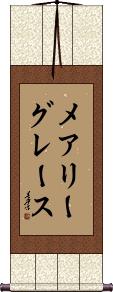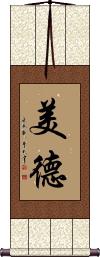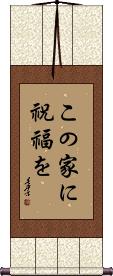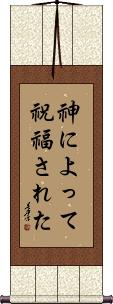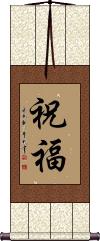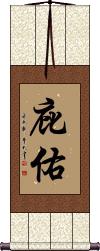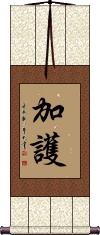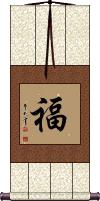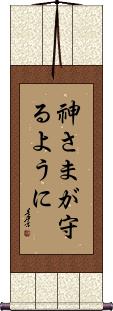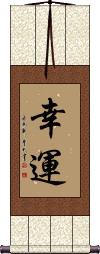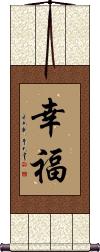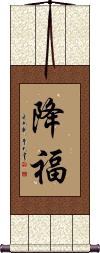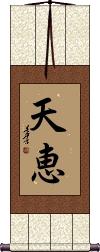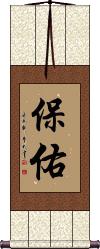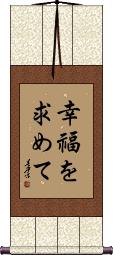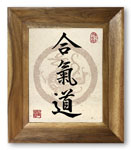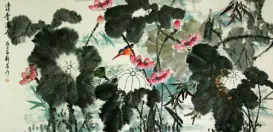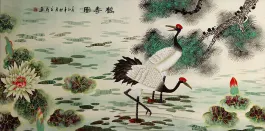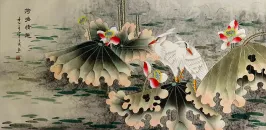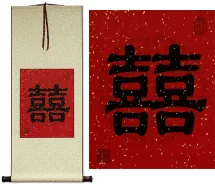Custom Grace Chinese & Japanese Calligraphy Wall Scroll
We have many options to create artwork with Grace characters on a wall scroll or portrait.
If you want to create a cool Grace wall scroll, this is the place. Below you will find a few Asian symbols that express the idea of grace.
1. Grace from Heaven / Grace from God
2. Grace
5. Grace of God / Divine Blessing
6. Divine Grace
7. Elegant / Exquisite / Grace
9. Grace from Heaven / Grace from God
10. Mary-Grace
11. Beautiful Virtue
13. Bless this House
14. Blessed by God
17. Divine Blessing
20. God Bless You
21. God Bless You / May God Protect You
22. God Bless You / God Be With You
23. Good Luck
24. Happiness
25. Heaven Blessing
Grace from Heaven / Grace from God
天恩 is the deepest way to say “Heaven's Grace” or “God's Grace” in Chinese.
The first character means Heaven or sky (referring, in this case, to the domain of God).
The second character means grace, blessings, benevolence, favor/favour, acts of kindness, merits, or beneficial influence.
This title can also be defined as:
Blessings of Heaven, Favor of the Emperor, Divination's luckiest day, or blessings of nature. Note: When you see “Emperor” above, remember that the Emperor, like the Pope, is theoretically chosen by God or seen as an emissary or conduit of God in ancient Asian culture. It would only be read that way in a certain context, such as “The Emperor, in his mercy, bestowed upon him Heaven's Grace, and the prisoner was set free.”
Note: Technically, this is a Japanese word too (pronounced "ten-on") but it’s rarely used in Japan anymore. Therefore, this title is best if your audience is Chinese.
Grace
恩 is often translated as “kind act from above,” as in “The Grace of God.”
This doesn't necessarily have to come from God. It could be a favor paid to you, or help that you received (or gave). Of course, you can decide for yourself whether the grace or favor given to you by a friend is actually a gift from God.
Other possible translations of this character:
Favor / favour, acts of kindness, merits, beneficial Influence, kindness, indebtedness, obligation, and benevolent influence.
Grace
Grace
Amazing Grace
Amazing Grace
アメイジング・グレイス is the Japanese Katakana for Amazing Grace.
This phonetically sounds like the English, “Amazing Grace” but does not hold that meaning since it is a transliteration versus a translation.
Note: Because this title is entirely Japanese Katakana, it should be written by a Japanese calligrapher.
Charm / Grace
Grace of God / Divine Blessing
Divine Grace
Elegant / Exquisite / Grace
Beyond elegant and exquisite elegance, 美妙 is also the word used to say “beautiful” or “marvelous” when referring to a work of art.
Can also be translated as exquisiteness, gracefulness.
Note: Not a commonly used word in Japanese.
Grace / Favor
恩寵 means grace or favor in Chinese characters, Japanese Kanji, and old Korean Hanja.
In ancient China, this was a special favor bestowed by a ruler. It could also be the Emperor's generosity towards a favorite person or concubine.
Grace / Favor
恩典 is one of several ways to express favor or grace in Chinese characters, Japanese Kanji, and old Korean Hanja.
This version can refer to an act of grace or the granting of a special privilege.
Grace from Heaven / Grace from God
Mary-Grace
Mary-Grace
Beautiful Virtue
美德 written in Chinese or Korean Hanja can also mean “grace of character” or “noble virtue.”
![]() There is a slight variation in the modern Japanese Kanji form of the second character. If you want the modern Japanese version, please click on the special Kanji shown to the right instead of the button above. Note that the traditional Chinese form is still readable and understood by Japanese people (
it’s
the ancient Japanese form anyway).
There is a slight variation in the modern Japanese Kanji form of the second character. If you want the modern Japanese version, please click on the special Kanji shown to the right instead of the button above. Note that the traditional Chinese form is still readable and understood by Japanese people (
it’s
the ancient Japanese form anyway).
Blessings on this Home
五福臨門 means “five good fortunes arrive [at the] door.”
It is understood to mean “may the five blessings descend upon this home.”
These blessings are known in ancient China to be: longevity, wealth, health, virtue, and natural death (living to old age). This is one of several auspicious sayings you might hear during the Chinese New Year.
Bless this House
This means “Bless this house” or “Bless this home,” in Japanese.
Some may also translate this as “Bless this family,” since the Kanji for home can also mean family.
Note: Because this selection contains some special Japanese Hiragana characters, it should be written by a Japanese calligrapher.
Blessed by God
Blessings and Protection
Blessings and Good Wishes
祝福 is a nice way to give good wishes to someone.
It can be a general blessing or used to congratulate someone for a special occasion or graduation.
This has a good meaning in Japanese but is more appropriate when expressed orally. 祝福 is not a natural selection for a wall scroll if your audience is Japanese.
Divine Blessing
Divine Protection
加護 is Japanese for “divine protection” or “the saving grace of God.”
Please consider this blessing to be Japanese only. This can have the same meaning in the context of Buddhism in Chinese, but it's also a nickname for “intensive care” at Chinese hospitals.
Note: My Japanese translator says this is not commonly used in Japanese. I added this because a customer asked for it. There is no better Japanese phrase to express this idea - so this is it if you want it.
Good Luck / Good Fortune
福 is pronounced “fu” in Chinese.
The character “fu” is posted by virtually all Chinese people on the doors of their homes during the Spring Festival (closely associated with the Chinese New Year).
One tradition from the Zhou Dynasty (beginning in 256 B.C.) holds that putting a fu symbol on your front door will keep the goddess of poverty away.
福 literally means good fortune, prosperity, blessed, blessedness, happiness, and fulfillment.
You'll also see this character in Vietnam (where Chinese characters were the written form until a romanization reform) where it is pronounced Phúc - a word commonly used in Vietnamese names because of its good meaning.
See Also: Lucky
God Bless You
God Bless You / May God Protect You
上帝保佑 is a blessing exchanged between Chinese Christians.
The first two characters mean God (The God of Zion). The second two characters express the idea of giving protection. Another way to translate this is “May God protect you.”
See Also: Guardian Angel
God Bless You / God Be With You
神さまが守るように is about as close as you can get to, “God Bless You” in Japanese.
This literally means “[May] God Protect [You].” It can also mean “God is Always With You,” as the word in this phrase that means “protect” can also mean to follow or be with. In fact, the Japanese dictionary entry for that word reads like this: to protect; to guard; to defend; to keep (i.e. a promise); to abide; to observe; to follow.
Note: Because this selection contains some special Japanese Hiragana characters, it should be written by a Japanese calligrapher.
Good Luck
幸運 can be translated as “good luck,” fortunate, lucky, and/or “good fortune” in Chinese, Korean and Japanese.
Occasionally, this is also translated as a type of happiness or a short way to write serendipity.
Happiness
幸福 is a general state of happiness that can also be translated as truly blessed, welfare, well-being, or fortunate.
Heaven Blessing
Blessed by Heaven
天恵 means “Heaven's Blessing,” “Blessings from Heaven,” or “Blessed by Heaven” in Japanese Kanji.
Depending on the context in which this is used, it can also mean “gift of nature,” or even “natural resources” (as in Heaven or God bestowed things like oil, iron, gold, and other natural resources upon mankind).
Heaven Blesses the Diligent
天道酬勤 can be interpreted in a few different ways:
God blesses those who work hard.
It is the way of Heaven to smile on the diligent.
God will reward those that are worthy.
Heaven blesses those who are diligent.
Whichever translation you like, a scroll like this on your wall may serve as a reminder to work hard because your diligence will pay off both in this life and the next.
Note: This can be pronounced in Korean, but it's not a commonly used term.
Blessings and Protection
保佑 is the more religious and sometimes superstitious word for protection in Chinese. It's sort of a blessing of protection and is often translated as “bless and protect,” “blessing,” or “to bless.”
This would be used as the protection or blessing that a deity (such as God) would bestow upon you. It is not religion-specific in the same way a language cannot be specific to any religion.
![]() Note: Sometimes the second character is written in the form shown to the right. Let us know if you have a preference when you place your order.
Note: Sometimes the second character is written in the form shown to the right. Let us know if you have a preference when you place your order.
See Also: Guardian Angel
Pursuit of Happiness
追尋幸福 is the best way to translate the English phrase “pursuit of happiness” into Chinese.
The first two characters mean “to pursue,” “to track down,” or “to search for.”
The last two mean happiness, happy, or being blessed.
See Also: Follow Your Dreams
Pursuit of Happiness
幸福を求めて is “Pursuit of Happiness” or “In Search of Happiness” in Japanese.
Here's how the characters break down:
幸福 (koufuku) happiness; blessedness; joy; well-being.
を (o) particle
求め (motome) to want; to seek; to pursue; to request
て (te) particle
Note: Because this selection contains some special Japanese Hiragana characters, it should be written by a Japanese calligrapher.
See Also: Follow Your Dreams
This in-stock artwork might be what you are looking for, and ships right away...
The following table may be helpful for those studying Chinese or Japanese...
| Title | Characters | Romaji (Romanized Japanese) | Various forms of Romanized Chinese | |
| Grace from Heaven Grace from God | 天恩 | tiān ēn / tian1 en1 / tian en / tianen | t`ien en / tienen / tien en | |
| Grace | 恩 | on | ēn / en1 / en | |
| Grace | 格蕾絲 格蕾丝 | gé lěi sī ge2 lei3 si1 ge lei si geleisi | ko lei ssu koleissu |
|
| Grace | グレース | gureesu / guresu | ||
| Amazing Grace | 奇異恩典 | qí yì ēn diǎn qi2 yi4 en1 dian3 qi yi en dian qiyiendian | ch`i i en tien chiientien chi i en tien |
|
| Amazing Grace | アメイジンググレイス | ameijingu gureisu ameijingugureisu | ||
| Charm Grace | 神韻 神韵 | shi nin / shinin | shén yùn / shen2 yun4 / shen yun / shenyun | shen yün / shenyün |
| Grace of God Divine Blessing | 神恵 / 神惠 神恵 | shin kei / shinkei | ||
| Divine Grace | 天佑 | ten yuu / tenyuu / ten yu | tiān yòu / tian1 you4 / tian you / tianyou | t`ien yu / tienyu / tien yu |
| Elegant Exquisite Grace | 美妙 | bimyou / bimyo | měi miào / mei3 miao4 / mei miao / meimiao | |
| Grace Favor | 恩寵 恩宠 | on chou / onchou / on cho | ēn chǒng / en1 chong3 / en chong / enchong | en ch`ung / enchung / en chung |
| Grace Favor | 恩典 | on ten / onten | ēn diǎn / en1 dian3 / en dian / endian | en tien / entien |
| Grace from Heaven Grace from God | 神の恩恵 | kami no on kei kaminoonkei | ||
| Mary-Grace | 瑪麗格雷斯 玛丽格雷斯 | mǎ lì gé léi sī ma3 li4 ge2 lei2 si1 ma li ge lei si maligeleisi | ma li ko lei ssu malikoleissu |
|
| Mary-Grace | メアリーグレース | meariigureesu meariguresu | ||
| Beautiful Virtue | 美德 美德 / 美徳 | bitoku | měi dé / mei3 de2 / mei de / meide | mei te / meite |
| Blessings on this Home | 五福臨門 五福临门 | wǔ fú lín mén wu3 fu2 lin2 men2 wu fu lin men wufulinmen | ||
| Bless this House | この家に祝福を | kono-ka ni shukufuku o kono-kanishukufukuo | ||
| Blessed by God | 神によって祝福された | kami ni yotte shukufuku sa remashita | ||
| Blessings and Protection | 祝福と保護 | shukufuku to hogo shukufukutohogo | ||
| Blessings and Good Wishes | 祝福 | shukufuku | zhù fú / zhu4 fu2 / zhu fu / zhufu | chu fu / chufu |
| Divine Blessing | 庇佑 / 庇祐 庇佑 | bì yòu / bi4 you4 / bi you / biyou | pi yu / piyu | |
| Divine Protection | 加護 加护 | ka go / kago | jiā hù / jia1 hu4 / jia hu / jiahu | chia hu / chiahu |
| Good Luck Good Fortune | 福 | fuku | fú / fu2 / fu | |
| God Bless You | お大事に | odaijini | ||
| God Bless You May God Protect You | 上帝保佑 | shàng dì bǎo yòu shang4 di4 bao3 you4 shang di bao you shangdibaoyou | shang ti pao yu shangtipaoyu |
|
| God Bless You God Be With You | 神さまが守るように | kami sa ma ga mamo ru you ni kamisamagamamoruyouni kami sa ma ga mamo ru yo ni | ||
| Good Luck | 幸運 幸运 | kou un / kouun / ko un | xìng yùn / xing4 yun4 / xing yun / xingyun | hsing yün / hsingyün |
| Happiness | 幸福 | koufuku / kofuku | xìng fú / xing4 fu2 / xing fu / xingfu | hsing fu / hsingfu |
| Heaven Blessing | 降福 | jiàng fú / jiang4 fu2 / jiang fu / jiangfu | chiang fu / chiangfu | |
| Blessed by Heaven | 天恵 | ten kei / tenkei | ||
| Heaven Blesses the Diligent | 天道酬勤 | tiān dào chóu qín tian1 dao4 chou2 qin2 tian dao chou qin tiandaochouqin | t`ien tao ch`ou ch`in tientaochouchin tien tao chou chin |
|
| Blessings and Protection | 保佑 / 保祐 保佑 | bǎo yòu / bao3 you4 / bao you / baoyou | pao yu / paoyu | |
| Pursuit of Happiness | 追尋幸福 追寻幸福 | zhuī xún xìng fú zhui1 xun2 xing4 fu2 zhui xun xing fu zhuixunxingfu | chui hsün hsing fu chuihsünhsingfu |
|
| Pursuit of Happiness | 幸福を求めて | koufuku o motome te koufukuomotomete kofuku o motome te | ||
| In some entries above you will see that characters have different versions above and below a line. In these cases, the characters above the line are Traditional Chinese, while the ones below are Simplified Chinese. | ||||
